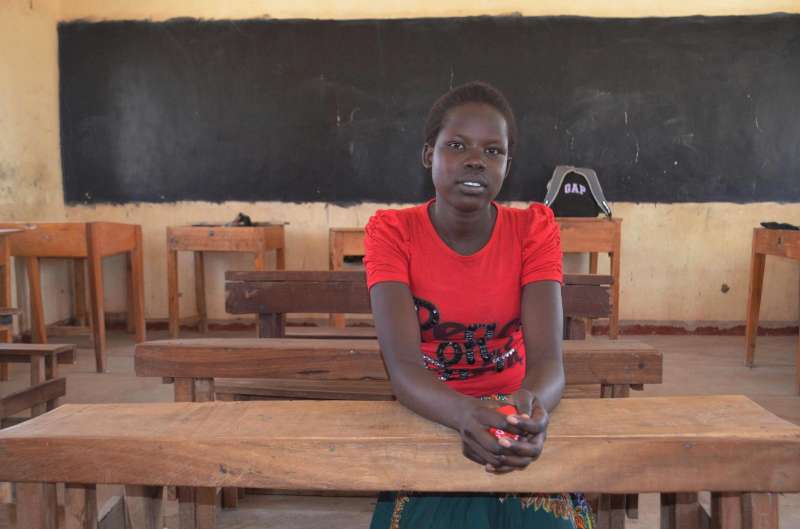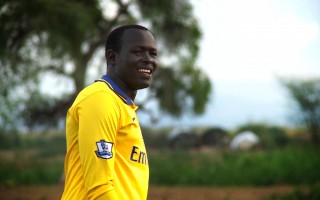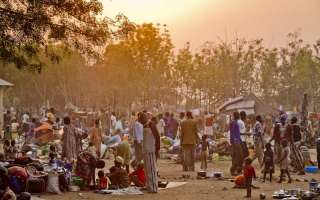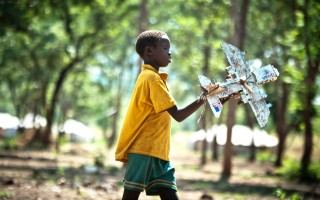
Naomi Chol scored the highest mark in her district in the annual Kenyan exams, a tribute to her hard work and the quality of education at the school.© UNHCR/C.Wachiaya
KAKUMA REFUGEE CAMP, Kenya, March 27 (UNHCR) – Naomi Chol studied at a school funded and supported by Oscar-winning actress Angelina Jolie Pitt, but the 16-year-old from South Sudan has become a celebrity herself in a Kenyan refugee camp.
“Everywhere I go, people call me and come to shake my hand,” she tells visitors to Kakuma camp where she studied in a school known locally as the Angelina Jolie Primary School. It was set up by the UNHCR Special Envoy in 2002 to cater for girls with special protection needs.
The reason for all the attention is Naomi’s excellent performance in the annual Kenya Certificate of Primary Education exams, which took place last November. More than 880,000 students sat the exam nationwide this year and Naomi scored 418 out of a possible 500 marks – the highest mark in the district in which Kakuma is located.
That’s not the only good news: the school, which opened with an initial enrolment of 150 girls, recorded an 86 percent pass rate. Today, some 250 girls study there, including refugees from Sudan, South Sudan, Somalia, Democratic Republic of the Congo, Ethiopia, Burundi and Uganda as well as some girls from the host community.
Naomi’s achievement is a tribute to the quality of education provided at the boarding school and to the policy, promoted by Jolie Pitt and UNHCR, of trying to ensure that all refugees get at least a primary education. Many of the 1,500 girls at the school who sat this year’s exams will hope to move on to secondary school.
“The school has consistently performed well since its inception,” noted UNHCR education officer, Mohamud Hure, who added that Naomi’s achievement “further cements the importance and impact of providing a safe learning environment for refugees.” She’s also become an inspiration to others. “We are proud of what she has achieved,” says Anyuak, a Class 5 student.
Naomi knows that she was lucky with her education and that the conditions at some other schools in Kakuma and elsewhere are tough. Problems include overcrowding, lack of qualified teachers, and shortage of school equipment and supplies. “I am lucky to have studied in a boarding school as it gave me more time to focus on studies. My parents also encouraged me a lot and reminded me of the great opportunity I have to be in school,” she says.
Things did not look so rosy in 2008, when her family fled conflict in their home area of South Sudan’s Upper Nile state and made their way to Kenya’s capital Nairobi. Her parents wanted her to get a good education but could not afford it. They decided to send her to stay with an aunt in Kakuma, where she was enrolled in 2012 as a boarder at the primary school.
Many other girls in the camp had given up on their studies, Naomi noted. “Most of my friends were just staying at home and some were even getting married. I didn’t want that for myself,” she adds.
Naomi has a goal: “I want to be a neurosurgeon. I love science and I know there aren’t many female neurosurgeons in the region, but I believe in myself,” she explains. And she hopes her next school, the respected Loreto Matunda Boarding School in Lodwar (a national school that is one of the top schools in the district) will bring her closer to that goal.
She also dreams of lasting peace in South Sudan so that she can help rebuild the country after so many years of conflict, both before and after independence in 2011. “Excelling in my education is the best gift I can offer to my country because, with education, one can achieve anything in life.”
Her message is a welcome one and shared by many other students. But UNHCR struggles to find places for all those primary students wishing to continue their studies in one of the four secondary schools in Kakuma.
Naomi’s teachers in Kakuma acknowledge this challenge and admit that deserving students like her need to be enrolled in good schools where they can continue to excel. “Chol is an obedient and bright girl,” says Isabella Muthoni, head teacher of the school. “She has made us all very proud and what she has achieved is not only a major boost for all the girls, but it is also proof that any girl under any circumstances can achieve success.”
By Cathy Wachiaya and Mohamud Hure in Kakuma Refugee Camp, Kenya





